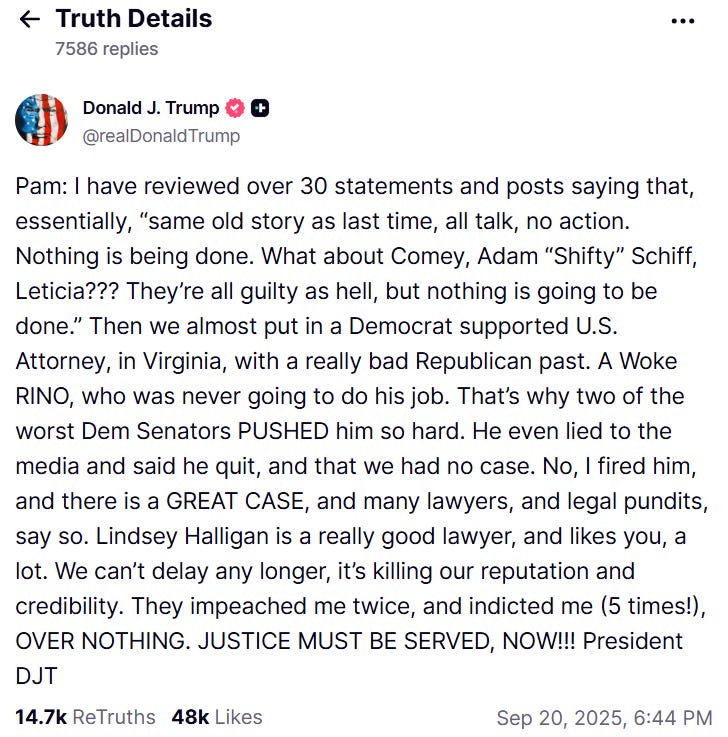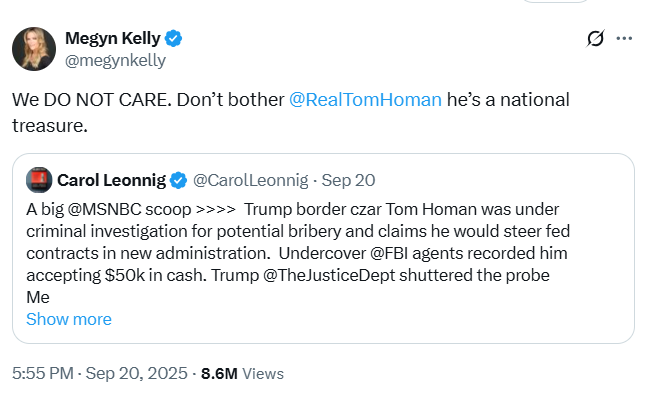Exposure Has Lost Its Power
Trump's message is: Sure you caught me. Who cares? Think of it as "Fake News!" 2.0.

Over the weekend, President Trump posted on Truth Social what looked a lot like a private message to Attorney General Pam Bondi, as even some in his administration admitted (“Yeah, he texts like that,” a Trump adviser told Rolling Stone). He expressed his frustration over the fact that the Department of Justice has not brought criminal charges against his political opponents, including Sen. Adam Schiff, New York Attorney General Leticia James, and former FBI Director James Comey. “We can’t delay any longer, it’s killing our reputation and credibility,” he said.
At any time in the preceding 250 years, ironclad proof of the president ordering the attorney general to bring bogus charges against his enemies would have been grounds for impeachment. Indeed, actions like this one — not precisely the same, but quite similar — were part of the articles of impeachment brought against Richard Nixon in 1974. The difference is that Nixon went to great lengths to conceal his crimes, while Trump just tweets them out.
This — and the story of border “czar” Tom Homan and the paper bag stuffed with 50 grand in cash, which we’ll get to in a moment — has me thinking about how Trump has managed to shift the way we think about the power of exposure.
Trump’s evolution on exposure
In pretty much every movie about journalism, most political thrillers, and entries in a host of other film genres, the idea of exposure is critical to the plot, and especially to the climax. Powerful people do something sinister, then go to great pains to keep the public from finding out. Watergate gave us the (usually false) idea that “the coverup is worse than the crime,” the point being that when threatened with the exposure of their nefarious deeds, the powerful will commit even worse nefarious deeds to keep them hidden. At the end of these films, the crime is exposed, and as a consequence the villain is brought down.
The underlying premise of this narrative is that the light of public attention inevitably brings justice. Once everyone knows what you’ve done, society’s judgment will be rendered and the wicked will be punished.
But that may not be as true as it used to be.
We can think of this as “Fake News!” 2.0. As you’ll recall, in 2016, the term “fake news” emerged to refer to blatantly fabricated claims offered in the form of “news,” as when the idea that Pope Francis had endorsed Trump ricocheted around the internet. Quickly seeing the power in the idea, Trump began referring to any news he didn’t like as “fake news,” encouraging his supporters to disbelieve anything they saw, read, or heard that didn’t reflect well on him.
But this is different. What Trump now asks is not that you say “I don’t believe it; that never happened,” but instead, “Who cares?” This is also distinct even from Trump doing things that ought to be scandalous but his base actually supports, like bombing civilian boats on the high seas because somebody thinks they might be bearing drugs. The “Who cares?” formulation doesn’t bother trying to defend the misdeed that has been exposed; it just moves on.
While we can see the seeds of Trump’s shamelessness in his entire life, that doesn’t mean he has never feared exposure; he really has evolved in his thinking, and I’d point to three key events that brought him where he is today.
The first was the Access Hollywood incident from October 2016, when the tape of him bragging about his ability to sexually assault women with impunity was exposed. I’m guessing most people have forgotten that in the immediate aftermath, when some Republicans were calling for him to be dropped from the ticket and many others thought the revelation had ended his chances of winning, Trump was persuaded by his freaked-out aides to do something completely out of character: apologize. Which he did:
But that may have been the last time he apologized for anything. The lesson Trump took is that his aides were wrong, and the appropriate way to deal with scandal is to go on the attack. The second key event was January 6 and its long tail of consequences. After fomenting an insurrection, Trump decided immediately — even as many in his party were condemning him, he was taken off Twitter and Facebook, and some of us naively thought his political career was over — that if he was persistent enough, not only could he make a comeback but he could convince his supporters that the violent conflagration they saw on their TVs was actually a “day of love,” a noble and mostly peaceful act by patriotic Americans. And so he has, to the point where his pardoning of every last criminal insurrectionist was barely a one-day story.
The final key moment in the evolution of Trump’s thinking was likely the Supreme Court’s appalling decision in the appropriately named Trump v. United States, which came down just before the 2024 election. The conservative majority ruled that presidents in general and Trump in particular are allowed to do all the crimes they like, because that’s what is necessary to have a sufficiently “energetic and vigorous President.” Somehow we made it 250 years with presidents pathetically drained of their energy and vigor by the need to follow the law, but that is no longer a problem. So now Trump knows that there are no legal consequences for anything he might do, and he is unleashed.
Another shocking scandal
Given the quantity and brazenness of this administration’s corruption, it’s not easy for a new scandal to shock us, but this report from MSNBC’s Carol Leonnig and Ken Dilanian is head-spinning:
In an undercover operation last year, the FBI recorded Tom Homan, now the White House border czar, accepting $50,000 in cash after indicating he could help the agents — who were posing as business executives — win government contracts in a second Trump administration, according to multiple people familiar with the probe and internal documents reviewed by MSNBC.
The FBI and the Justice Department planned to wait to see whether Homan would deliver on his alleged promise once he became the nation’s top immigration official. But the case indefinitely stalled soon after Donald Trump became president again in January, according to six sources familiar with the matter. In recent weeks, Trump appointees officially closed the investigation, after FBI Director Kash Patel requested a status update on the case, two of the people said.
Set aside for now the fact that the Supreme Court has defined public corruption so narrowly that, believe it or not, Homan would probably get off if he was prosecuted. Or the fact that the Trump DoJ has basically decided it isn’t going to go after any public corruption cases. At the very least, you’d think that having the point person on their central policy initiative on tape taking $50,000 in a paper bag for the promise of future federal contracts would be so embarrassing that Homan would resign, or the White House would force him to.
Maybe that will happen eventually. But for now, the White House is acting as though neither they nor Homan have anything to be embarrassed about.
They may be calculating that the Homan story will blow over, and that’s possible too. But by keeping him around, the White House is effectively saying, Sure, you caught him. Who cares? Meanwhile, the president has increased his family’s personal wealth by billions of dollars just in the last eight months, by effectively hanging up a sign saying “Want to bribe the president of the United States? Here are five ways you can do it.” And what is the response of the right to all this?
Does this mean that exposure has lost any potency? Not quite. It still matters for the rest of us; people lose jobs and friends and social acceptance by being exposed all the time (just ask that adulterous Coldplay couple). And it’s important to always keep in mind that Donald Trump is an extremely unpopular president; just because he says something over and over doesn’t mean that most Americans believe him.
But it does seem that the power of exposure can be mitigated if the exposed refuses to accept that they’ve done something wrong or have anything to be ashamed of. That’s the playbook Trump is following. Now just imagine if we had a president capable of shame.
Thank you for reading The Cross Section. This site has no paywall, so I depend on the generosity of readers to sustain the work I present here. If you find what you read valuable and would like it to continue, consider becoming a paid subscriber.




The lack of any set of moral principles is so very opposed to the “traditional” values the GOP always trumpets that the party’s acquiescence to Trump has elevated hypocrisy to a stratospheric level. Perhaps a new term is needed: There’s hypocrisy and now there’s hypocrisy at the MAGA level. Make America Gawp Again!
If anyone in the Trump administration, including Trump himself, had the capacity to feel shame, it would be a huge help in getting back to some semblance of decency in this county. But, the inability to feel shame is a requirement to work for Trump. Indeed, if one had the ability to feel shame they would not/could not work for Trump. It would simply be impossible.